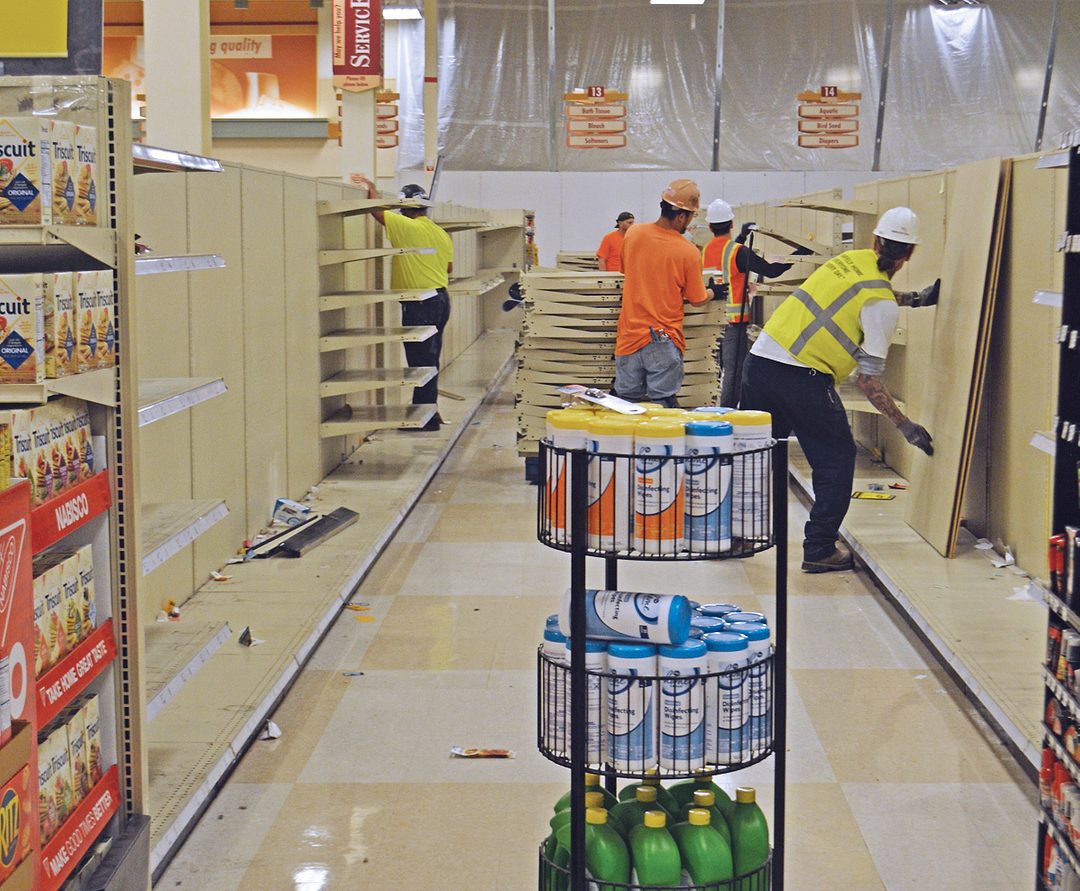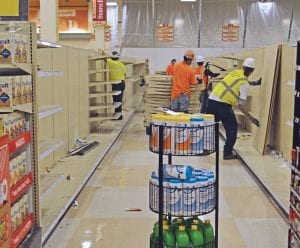
Home » Dozens of Tri-City subcontractors still left without paycheck
Dozens of Tri-City subcontractors still left without paycheck

October 12, 2018
Contractors who once did business with Vandervert Construction Inc. are separating themselves into two groups: lucky or unlucky.
“We are one of the lucky ones,” said Mary Rosen, controller for Richland-based Garrett Electric Company Inc.
The lucky ones are those who got paid most or all of what they were owed for doing work for Vandervert Construction before it went out of business at the start of 2018, owing tens of millions to businesses and the state of Washington.
Rosen said Garrett Electric recovered the estimated $90,000 owed in the original claim filed in Spokane County Superior Court receivership documents.
Tyrone and Cindy Riggle of Kennewick’s Riggle Plumbing Inc. estimate they were owed $300,000 at the time the court began supervising Vandervert’s assets and liabilities. The Riggles recently recovered all but about $9,000 they said they were owed.
“Thirty years ago it would have bankrupt us,” Cindy Riggle said. “These small companies that are just starting, I can’t imagine. We’ve been around a long time.”
Greg Gutzmer, owner of Richland’s Ace Electric, said, “We are actually one of the lucky contractors. We were owed around $90,000 in round figures, but the only project we had going was in Marysville. The owner of that project paid us off to get us to come back to the job site to continue working. So we weren’t out anything.”
But that meant the project owner for Home2Suites by Hilton in Marysville likely had to pay twice: once to Vandervert Construction and once to the subcontractor who never got a check from Spokane-based Vandervert Construction.
This is what happened to Wes Heyden, owner of the local Roasters Coffee chain, who falls into the much larger category of “unlucky ones,” which includes both project owners and subcontractors.
“I had to pay full cash to the subs. I really wasn’t expecting it to go all the way through, but it did,” Heyden said.
Heyden’s project to build a new Roasters stand at 3205 Keene Road in West Richland was valued at about $400,000. Heyden said he ended up paying an additional $185,000 to remove all the liens that had been filed by subcontractors hired by Vandervert Construction and never compensated for their completed work.
This included a lien from Greg Ford, owner of Richland’s Brashear Electric, who said, “The owner paid Vandervert, but Vandervert never paid the subs. If I was within my lien rights, I put liens on the property,” he said.
Under Washington law, those who supply materials or labor to a contractor have 90 days to file a lien against the property if they are not paid for their work.
Heyden’s project was completed in November 2017, and when Vandervert fell into receivership in January 2018, the deadline was close at hand for subcontractors to stake their claim to the money owed.
Attorney Barry Davidson of Spokane-based firm Davidson, Backman, Medeiros PLLC was appointed receiver for Vandervert Construction, a method that’s used as an alternative to bankruptcy.
“It’s a proceeding that, in this instance, was probably less expensive than bankruptcy and seemed like an appropriate vehicle,” Davidson said. “This allows for the disposition of assets, the collection of accounts and terminations of claims and the distribution of funds.”
But that only applies if there is any money left to distribute in the end.
Davidson explained there’s a priority order when it comes to the voluminous number of claims against the company, including a $3.3 million claim from Washington’s Department of Revenue. It’s one of more than $40 million in claims filed initially between February and June 2018, with most claims dated February and March.
“As a rule of thumb, that could be twice as high as it should be for gross estimates,” said Davidson. “The numbers are very fluid and many are placeholders.”
He expects a more realistic amount of monies owed could be around $20 million.
Many of the claims have hundreds of pages of attachments, said Davidson, which will need to be sorted through. Subcontractors fall under the title of “general unsecured creditors” and these tend to land at the bottom of the priority list for repayment when it comes time to distribute money from any remaining assets.
Heyden believes there are other subcontractors who worked on his project who weren’t paid by Vandervert Construction, but no longer within the 90-day window to file a lien and likely had to eat their own costs. This happened with Ford on the building that houses MOD Pizza in Richland.
“That’s one where I won’t be able to collect on,” Ford said.
Ford’s original claim filing was just below a-half-million dollars. He’s now in litigation with other third parties he did work for to try to recoup some of his losses.
Heyden hoped to avoid additional legal action with the subcontractors who did put claims on his property.
“I knew if I was going to do this and be a stand-up businessman, I wasn’t going to take these guys to court,” Heyden said.
Still, Heyden hoped some of the subcontractors would make a deal with him, potentially discounting their fees with the knowledge he’d already paid Vandervert Construction in full. Heyden recalled Kennewick’s Padilla Masonry took about a third off the cost it was owed, and Vancouver’s North County Concrete Inc. cut its price in half.
The rest had a legal right to every penny they invoiced and Heyden had no choice but to pay it, which he recently finished doing.
“You have no idea how good it feels to pay these guys off, move through the year, and make it through. I’ve been so appreciative of the community support. It’s kept me humble,” Heyden said.
Heyden paid Ford for electrical work performed on the Roasters project, but Ford doesn’t expect to get back all the money he put out on various jobs.
“I trusted that (Vandervert Construction) would pay, but when the smoke cleared and the dust settled, they owed me $495,000,” Ford said. “I’m now down to $234,000. If I’m lucky, I’m going to end up eating $190,000, not counting attorney’s fees.”
For those who might suggest Ford was overextended, the subcontractor said he trusted Vandervert Construction would pay, despite a recent history of slow payments.
“They were a million-dollar-a-year customer of mine for a long time. I worked with them for about 13 years. If it would have been a newer customer, I would have stopped a long time ago,” he said.
Local subcontractors say the slow payments began after Dick Vandervert sold the company to his former project manager, Tim Stulc, about seven years ago. Stulc then became Vandervert Construction’s president. Under Dick Vandervert’s ownership, subcontractors say the company was very reliable.
“You could set your watch by getting paid by him,” Gutzmer said.
Ford said there was a marked difference in the timing of payments by summer 2017.
“I started getting checks and they were due in the middle of June, written in June and I was receiving them in October. I think they were sending copies of the checks to the project owner to show they were paying the subs. That’s when I knew we were in deep sh--,” he said.
Tyrone Riggle, president of Riggle Plumbing, noticed the same pattern.
“They have always taken forever. We’d send a bill in February and get paid in June or July,” Riggle said.
Riggle, Ford and others said they expected the money would come in eventually.
“I just assumed Dick Vandervert still owned it,” Gutzmer said. “Once I realized we were getting paid late all the time, I realized Dick didn’t own it anymore. I sent Tim (Stulc) an email with my concerns that said, ‘I’m getting nervous.’ I knew of three hotel projects that weren’t getting paid. His response was, ‘Don’t worry about the hotel rumor mill, you’re getting paid.’ ”
At the time Gutzmer was growing concerned, Riggle had just invoiced Vandervert Construction for remodels of Fred Meyer and Columbia Community Church, called C3, both in Richland.
Riggle’s company had also worked on Roasters and Richland’s Panera Bread, and had just started on a remodel of Richland’s Hampton Inn.
Panera LLC is listed in receivership documents as being owed more than $400,000.
Months earlier, Riggle had tried reaching out to Fred Meyer’s parent company, Kroger, to make them aware the subcontractors on the project for 101 Wellsian Way were not getting paid.
“I was told to keep my mouth quiet, basically from Tim (Stulc), because of what our contract says, ‘You should not be talking to our owner.’ The way I look at it, this is my town, these are my clients. They were my clients before they were yours, and I want to protect them, too,” Riggle said.
At the same time, Steve Bushman, owner of Kennewick’s Palmer Roofing, threatened to walk off a project.
“I called (Stulc) up and said we were out, and I said, ‘Until I can get a payment, I’m not coming back.’ It took a week or so but he paid. I knew there was a reason for that slow pay,” Bushman said.
Riggle said, “Tim (Stulc) had made a special trip down to put the flames out, calm everybody down, and said, ‘Everyone’s going to get paid.’ ”
Ford also reached out to Stulc for answers. “Stulc said he was going to write it off and we set up a time to meet for coffee. He no-showed for coffee and then Tuesday he called and said he was going out of business,” he said.
The company’s swift downfall took most people by surprise, and Davidson said that included Stulc himself.
“The decision was forced on the company in the last day or two before it closed,” the attorney said.
While subcontractors would argue Stulc likely wasn’t forthcoming about money troubles, Davidson said, “Most companies that find themselves in financial distress seem to have various problems over time that are not significant themselves. In this case, there were delays in payments, subs that failed Vandervert Construction on specific projects and the inability to perform on ongoing projects, so this did happen suddenly.”
When reached by phone, Stulc referred all questions and statements to Davidson and said he had no comment when asked whether he had a message for the Tri-City subcontractors who were left unpaid.
“The company expected to receive additional funding that did not materialize and they found themselves in an unexpected and regrettable circumstance that resulted in the termination of projects,” Davidson said.

This included a hotel project in Bellevue that some believe might have been underbid in a method described as “chasing the money” with the intent of getting quick cash for one project to pay off other outstanding debts.
“When we were doing Fred Meyer, I think what happened was, he threw a price out there that was low to get the job to help him get some money in there. This is an $11 million job,” Riggle said.
“Bellevue was one where they had the most problems,” Davidson said. “Subs walking off the job, severe weather. The magnitude of it was a most difficult situation.”
“I got the impression he’d been robbing Peter to pay Paul,” said Bushman, whose company is listed on the initial receivership claim as being owed roughly $150,000. “Whichever one was the squeaky wheel would get paid. Once I became the squeaky wheel, I got paid.”
The original owner of the company, Dick Vandervert, did not respond to attempts to reach him by phone.
Dick Vandervert now operates Vandervert Development LLC. His company is also one of the many claimants on the receivership, seeking nearly $650,000.
“They don’t make ’em much better than Dick Vandervert,” Ford said. “It’s too bad his company name is slandered.”
Dick Vandervert, and his wife Bonnie, are named in a lawsuit filed in Benton County Superior Court by Pasco’s American Rock Inc. The litigation also names Vandervert Construction and its bond insurer in seeking recovery of an estimated $45,000.
Kennewick MB is also seeking about $225,000 from Vandervert Construction and its bond insurer through a lawsuit in King County.
“When a receivership is filed, the law provides for an automatic stay of actions against the company. It allows for the litigation to be centralized,” Davidson said.
Vandervert Construction is pinning some of its hopes for financial recovery on a $1.1 million lawsuit against Chewelah Basin Ski Corp. for a project in Stevens County that fell into foreclosure. The results of this lawsuit could affect the overall timeline for the receivership and any potential distribution of assets.
“The time it takes to resolve this will also depend on the time that (Vandervert Construction) has to resolve its claims on other companies,” Davidson said.
Originally listed as owning a claim for $297,606, Tyrone Riggle gets emotional when he talks about how he’s been fortunate enough to recoup most of what he was owed, knowing others aren’t as lucky.
“Dick and Bonnie (Vandervert) paid us for Hampton Inn. And then C3 paid us, I think they probably paid double. And then Kroger ended up giving us a check in July,” Tyrone Riggle said. “I feel bad for the other people. It will bankrupt somebody.
His voice broke as he added, “I know some of the people that (Stulc) owes money to and I’ve never told them that I’ve gotten paid. I don’t want them to feel like, ‘Haha I got paid and you didn’t.’ ”
Riggle Vice President Cindy Riggle said, “I would have never guessed Vandervert (Construction) would have done this to us.”
The receivership process is still underway and Davidson has no prediction on how long it could take to resolve. Auctions have been held to sell vehicles, forklifts and shop equipment.
“The money that comes in becomes part of receivership funds and the distribution is based on respective priorities,” Davidson said. He says tax liens have priority over most or all claims, followed by pay wage claims.
“If funds are exhausted and there’s not enough money, the creditors could remain unpaid,” he said.
“This was a hard lesson from the aspect of being an entrepreneur,” Heyden said. “I definitely learned a lot. In the old days, this would have broken me tremendously. Now I’ve been beaten up so much, I’ve learned to love every experience. It’s just money, so I guess it comes and goes.”
“To me, it was greed,” Tyrone Riggle said. “Be careful what you wish for. You want to be the best, the greatest, the biggest, and all that. And then look at what happened.”
Local News
KEYWORDS october 2018





